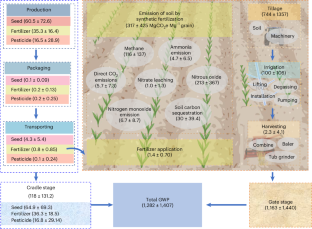传统农业加剧了全球变暖,同时降低了系统的可持续性
IF 29.6
1区 地球科学
Q1 ENVIRONMENTAL SCIENCES
引用次数: 0
摘要
自 "绿色革命 "以来,农业生产的集约化带来了产量的大幅增长,但同时也增加了人为温室气体排放。在这里,我们通过提供从种子到产量的全球综合 "摇篮到农田 "量化数据,表明从 1961 年到 2020 年,粮食作物传统农业的全球升温潜能值(GWP)增加了八倍,而可持续发展指数(SI)却下降了三倍。耕作、合成肥料和灌溉共占全球升温潜能值增加的 90%,这与施肥和地下水使用量增加了十倍以及机械化和灌溉面积增加了一倍有关。我们强调了全球升温潜能值高而 SI 低的地区,如南亚,并预测到 2100 年,农业全球升温潜能值将比 2020 年增加三倍(3.3 ± 0.73 PgCO2e),原因是投入品的使用效率下降。绿色能源和气候智能型农业技术可将 2100 年的预计全球升温潜能值降至 2.3 PgCO2e,并将 SI 提高四倍。本文章由计算机程序翻译,如有差异,请以英文原文为准。


Conventional agriculture increases global warming while decreasing system sustainability
Intensification of farming since the Green Revolution has led to large increases in yield but has also increased anthropogenic greenhouse gas emissions. Here, by providing a global comprehensive cradle-to-gate quantification from seed to yield, we show that the global warming potential (GWP) of conventional agriculture of grain crops has increased eightfold from 1961 to 2020, whereas the sustainability index (SI) has decreased threefold. Tillage, synthetic fertilizers and irrigation together accounted for 90% of the increased GWP, linked to tenfold increases in fertilization and groundwater use and more than doubled mechanized and irrigated areas. We highlight regions with high GWP and low SI, such as South Asia, and project further threefold increases in agriculture GWP by 2100 compared with 2020 (3.3 ± 0.73 PgCO2e) driven by declined use efficiency of the inputs. Green energy and climate-smart agriculture techniques can reduce the projected GWP in 2100 to 2.3 PgCO2e and increase the SI fourfold. The authors provide a global, cradle-to-gate quantification of the changes in the global warming potential and sustainability index of conventional agriculture from 1961 to the 2020s. They show an eightfold global warming potential increase and threefold decrease in sustainability index, largely due to tillage, fertilizer use and irrigation.
求助全文
通过发布文献求助,成功后即可免费获取论文全文。
去求助
来源期刊

Nature Climate Change
ENVIRONMENTAL SCIENCES-METEOROLOGY & ATMOSPHERIC SCIENCES
CiteScore
40.30
自引率
1.60%
发文量
267
审稿时长
4-8 weeks
期刊介绍:
Nature Climate Change is dedicated to addressing the scientific challenge of understanding Earth's changing climate and its societal implications. As a monthly journal, it publishes significant and cutting-edge research on the nature, causes, and impacts of global climate change, as well as its implications for the economy, policy, and the world at large.
The journal publishes original research spanning the natural and social sciences, synthesizing interdisciplinary research to provide a comprehensive understanding of climate change. It upholds the high standards set by all Nature-branded journals, ensuring top-tier original research through a fair and rigorous review process, broad readership access, high standards of copy editing and production, rapid publication, and independence from academic societies and other vested interests.
Nature Climate Change serves as a platform for discussion among experts, publishing opinion, analysis, and review articles. It also features Research Highlights to highlight important developments in the field and original reporting from renowned science journalists in the form of feature articles.
Topics covered in the journal include adaptation, atmospheric science, ecology, economics, energy, impacts and vulnerability, mitigation, oceanography, policy, sociology, and sustainability, among others.
 求助内容:
求助内容: 应助结果提醒方式:
应助结果提醒方式:


